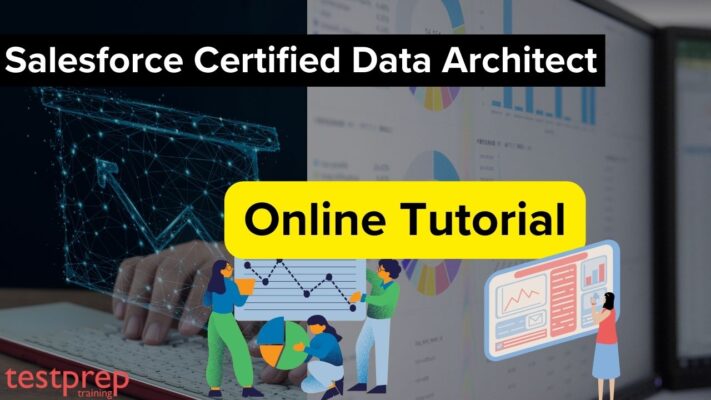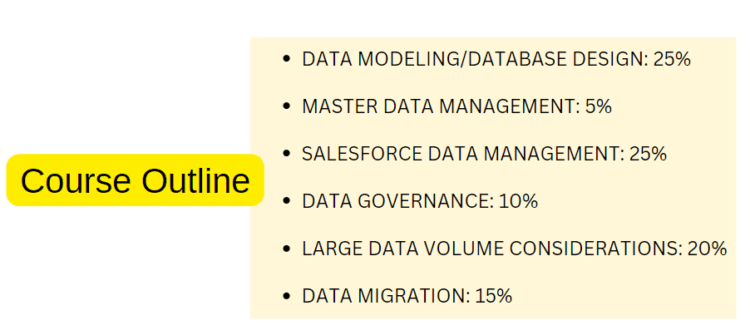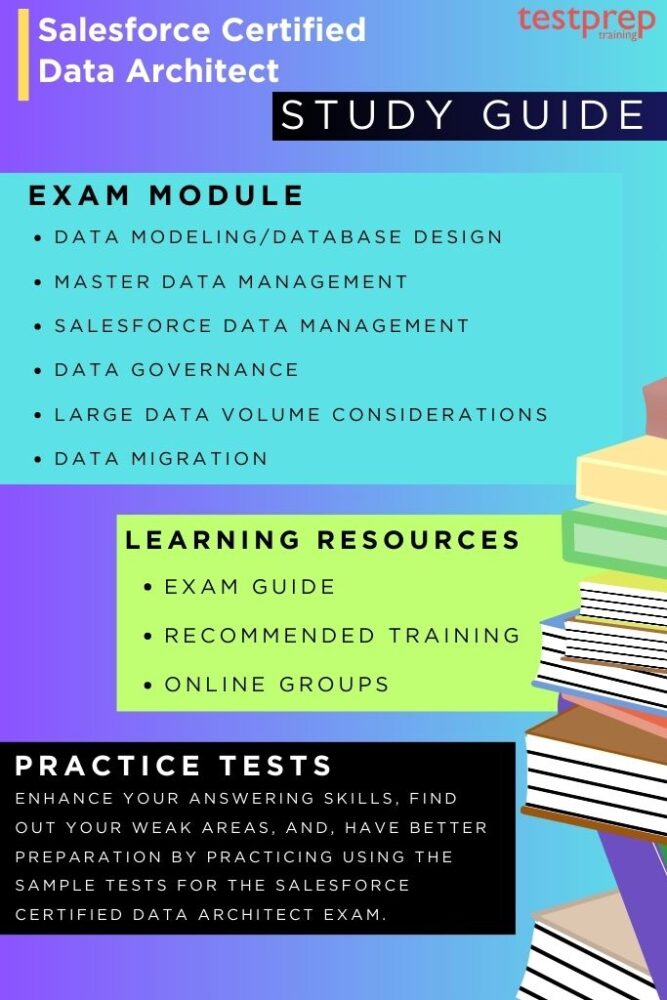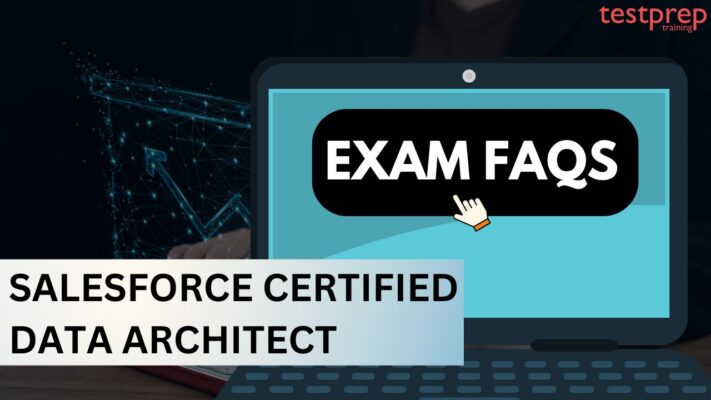Salesforce Certified Data Architect

The Salesforce Certified Data Architect certification is for architects who evaluate the architecture setup and needs, creating robust, flexible, and efficient solutions on the Customer 360 platform. The exam evaluates the setup and needs of a system and creates reliable, scalable, and efficient solutions on the Customer 360 Platform, especially for managing business data.
Knowledge Area:
Candidates should have an understanding of different frameworks for organizing data, including key components like data collection, integration, storage, managing master data, handling metadata, and ensuring data quality, security, and delivery. They have experience in understanding clients’ needs regarding data quality and developing solutions to maintain top-notch data quality, ensuring accuracy and avoiding duplicates. They can also suggest changes within organizations to improve data management practices. Additionally, they’re skilled at communicating solutions and discussing design choices with business stakeholders. Furthermore, they should be skilled in:
- Creating data models and designing databases
- Managing master data effectively
- Handling data in Salesforce
- Implementing data governance measures
- Dealing with large volumes of data
- Executing data migrations
Additionally, these architects must be capable of explaining solutions and trade-offs between designs to both business and IT stakeholders.
Experience Required:
The Salesforce Certified Data Architect typically possesses the following qualifications:
- 2 to 3 years of experience working with Salesforce
- Over 5 years of experience supporting or implementing solutions focused on handling data
Exam Learning Area
The Salesforce Certified Data Architect candidate demonstrates expertise, skills, and knowledge in the following areas:
- Creating data models and designing databases
- Managing custom fields, master-detail relationships, and lookup relationships
- Understanding client needs and aligning them with database requirements
- Familiarity with the standard object structure for Salesforce Sales and Service Cloud
- Effective utilization of Salesforce standards and big objects
- Understanding the connection between standard objects and Salesforce license types
- Addressing challenges related to handling large volumes of data
- Implementing indexing, LDV migrations, and optimizing performance
- Proficiency in Salesforce Platform declarative and programming concepts
- Utilizing tools such as Data Loader and ETL platforms for scripting
- Upholding principles of data stewardship
- Possessing skills in maintaining data quality and cleanliness.
Exam Details
- The exam comprises 60 multiple-choice/multiple-select questions along with up to 5 non-scored questions, and candidates are allotted 105 minutes to complete it.
- A passing score of 58% is required.
- The exam can be taken either onsite at a testing center or in an online proctored environment.
- No hard-copy or online materials are allowed for reference during the exam.
- For scheduling information, please click here.
Registering for the Exam
Here’s how to register for the Salesforce Accredited B2B Commerce Administrator:
- Log in to Webassessor at www.webassessor.com/salesforce. If you don’t have a test taker profile, create one.
- Click on “Register for an Exam.”
- Find the exam you want and choose the delivery method: onsite proctored or online proctored. Click “Register.”
- For onsite proctored exam:
- Pick a testing center.
- Choose the date and time, read the policies, and acknowledge.
- For online proctored exams:
- Choose the date and time, read the policies, and acknowledge.
- Online exams adjust to your time zone from your Webassessor profile.
- Click “Select.”
- Review details, then click “Checkout.”
- Enter your payment info, including any voucher/coupon codes and/or credit card details. Taxes apply per local laws.
- Click “Submit.”
- You’ll get a purchase confirmation. Click “Done.”
- An email confirming your registration and purchase will be sent to you.
Course Outline
The exam topics are:

Understanding Data Modeling/Database Design: 25%
- Comparing and contrasting various techniques and considerations for designing a data model for the Customer 360 platform. (e.g. objects, fields & relationships, object features).
- Given a scenario, recommending approaches and techniques to design a scalable data model that obeys the current security and sharing model.
- Comparing and contrasting various techniques, approaches, and considerations for capturing and managing business and technical metadata (e.g. business dictionary, data lineage, taxonomy, data classification).
- Comparing and contrasting the different reasons for implementing Big Objects vs Standard/Custom objects within a production instance, alongside the unique pros and cons of utilizing Big Objects in a Salesforce data model.
- Given a customer scenario, recommending approaches and techniques to avoid data skew (record locking, sharing calculation issues, and excessive child-to-parent relationships).
Learn about Master Data Management: 5%
- Comparing and contrasting the various techniques, approaches, and considerations for implementing Master Data Management Solutions (e.g. MDM implementation styles, harmonizing & consolidating data from multiple sources, establishing data survivorship rules, thresholds & weights, leveraging external reference data for enrichment, Canonical modeling techniques, hierarchy management.)
- Given a customer scenario, recommending and using techniques for establishing a “golden record” or “system of truth” for the customer domain in a Single Org
- Given a customer scenario, recommending approaches and techniques for consolidating data attributes from multiple sources. Discuss criteria and methodology for picking the winning attributes.
- Given a customer scenario, recommending appropriate approaches and techniques to capture and maintain customer reference & metadata to preserve traceability and establish a common context for business rules
Understanding Salesforce Data Management: 25%
- Recommending an appropriate combination of Salesforce license types to effectively leverage standard and custom objects to meet business needs.
- Recommending techniques to ensure data is persisted in a consistent manner.
- Describing techniques to represent a single view of the customer on the Salesforce platform.
- Recommending a design to effectively consolidate and/or leverage data from multiple Salesforce instances.
Explore Data Governance: 10%
- Recommending an approach for designing a GDPR-compliant data model. Discuss the various options to identify, classify and protect personal and sensitive information.
- Comparing and contrasting various approaches and considerations for designing and implementing an enterprise data governance program.
Understanding Large Data Volume Considerations: 20%
- Designing a data model that scales considering large data volume and solution performance.
- Recommending a data archiving and purging plan that is optimal for customer’s data storage management needs.
- Deciding when to use virtualized data and describe virtualized data options.
Learn about Data Migration: 15%
- Recommending appropriate techniques and methods for ensuring high data quality at load time.
- Comparing and contrasting various techniques for improving performance when migrating large data volumes into Salesforce.
- Comparing and contrasting various techniques and considerations for exporting data from Salesforce.
Salesforce Certified Data Architect Exam FAQs
Salesforce Certified Data Architect Study Guide

1. Understand Exam Guide
The guide for the Salesforce Certified Data Architect exam is created to assess your readiness for passing the certification exam. This guide provides information about the intended audience for the certification, recommended training materials, and a comprehensive list of exam objectives—all designed to assist you in passing. To enhance your likelihood of success, Salesforce advises a combination of practical experience, participation in courses, and self-directed study.
2. Exam Objectives
Thoroughly examining the exam objectives is vital to prevent overlooking crucial details. As highlighted earlier, thoroughly reviewing the course outline is essential for preparing for the exam, ensuring you address all required topics. Going over the exam objectives repeatedly not only facilitates quicker comprehension of concepts but also enhances your confidence.
Hence, revising is a critical phase often overlooked in exam readiness, playing a pivotal role in fortifying your knowledge and preparedness. Consistent revision helps in keeping the information fresh in your memory, improving your chances of success on the exam day. It acts as a valuable practice to solidify your understanding and identify any areas that may require additional focus.
- Data modeling/Database Design: 25%
- Master Data Management: 5%
- Salesforce Data Management: 25%
- Data Governance: 10%
- Large Data Volume considerations: 20%
- Data Migration: 15%
3. Recommended trainingSalesforce suggests hands-on experience, completing training courses, exploring Trailhead trails, and engaging in self-study in the topics specified in the Exam Outline section of this exam guide. The self-study materials recommended for this exam include:
- Trailmix: Architect Journey: Data Architect
- Expert led-class: Build Data Architect Expertise (ARC201)
4. Participate in Study Groups
Engaging in an Online Community, such as the Salesforce Trailhead Community, is a great way to evaluate your standing in the field. It offers a platform to connect with peers and stay updated. Exploring discussions, questions, answers, and comments related to real-world scenarios provides valuable insights. The variety of viewpoints contributes to more dynamic content, enriching your comprehension. Additionally, these groups keep you informed about any changes to the exam, boosting your confidence in your preparation.
5. Utilize Practice Tests
Once you’ve completed your preparation, it’s time to enter the performance phase, also known as self-assessment. This step is crucial for identifying your strengths and weaknesses, enhancing confidence, and improving time management skills. Practice exams are designed to simulate real exam conditions, giving candidates a realistic experience.
They enable you to evaluate your readiness and make any necessary adjustments to ensure success on the actual exam day. It’s an invaluable opportunity to sharpen your skills and gain confidence in addressing the challenges that may arise during the actual exam. Regular self-assessment is a vital aspect of achieving peak performance and ensuring a seamless exam experience.



